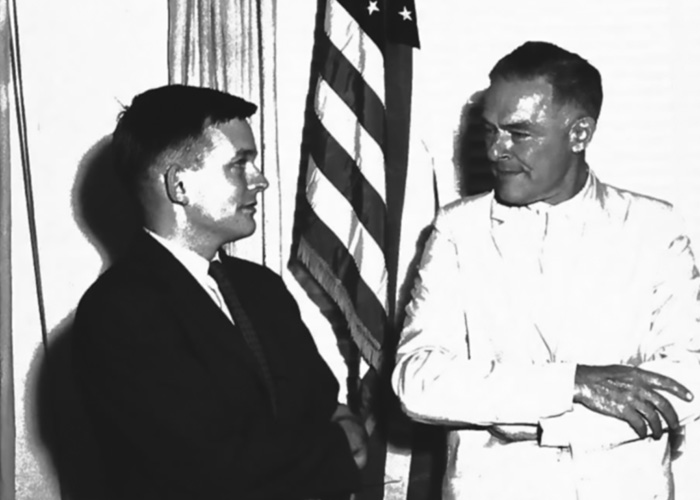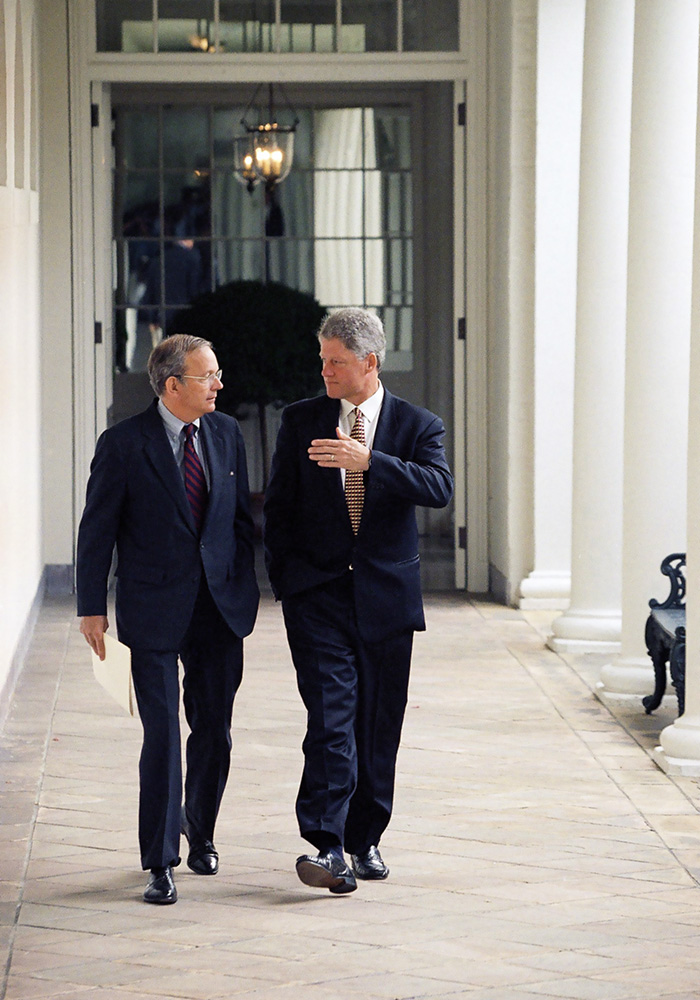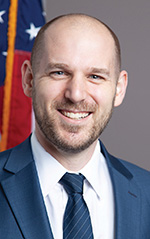Idealism, Diplomacy and Power: Tony Lake’s Story
Through six decades and two major foreign policy crucibles—Vietnam and the Balkans—Tony Lake showed a steady commitment to public service, as well as a belief in speaking truth to power.
BY RENNIE A. SILVA
Fifty years ago, Anthony Lake resigned from the Foreign Service over the war in Vietnam. He later returned to government service and went on to play a pivotal role in developing the Dayton Accords that ended the Bosnian War. The conviction that it is essential for diplomats and foreign affairs officials to speak truth to power was a constant in his career, the lessons of which remain relevant today.
A “Low-Profile” Kind of Guy

U.S. Ambassador to South Vietnam Henry Cabot Lodge Jr., at right, with his staff assistant, FSO Anthony Lake, at Embassy Saigon in 1963.
Courtesy of Tony Lake
On a wall in Lake’s home office hangs a framed photograph of him with President Bill Clinton inside Marine One. Light streams into the helicopter from a small panel window, illuminating Clinton; Lake is seated off to the side. “I love that photo, because the president is in the spotlight, and I’m in the shadows,” Lake says, only half-joking. During a career that spanned six decades and five administrations, he worked on foreign policy at the highest levels: He served as national security adviser, director of policy planning and executive director of UNICEF; he played a leading role in helping to end conflicts in Bosnia, Northern Ireland and Eritrea; and he advised more than a half-dozen presidential candidates, including Bill Clinton and Barack Obama. Yet, according to friends and colleagues, he has always shunned the spotlight. “Tony is a low-profile kind of guy,” says I.M. Destler, who first met Lake when they were freshmen at Harvard in the late 1950s and later co-authored a book on American foreign policy with him.
I first learned about Lake more than a decade ago, when I joined the Peace Corps and was assigned to Southeast Asia, the same region where he started his own career in the Foreign Service a half-century earlier. His work on Vietnam and eventual decision to leave the Department of State over the war fascinated me. When I reached out to Lake earlier this year and asked to discuss his story in depth, he initially greeted my request with self-deprecating humor: “I’ve had a hard time holding down a job,” he quipped.
Lake’s self-effacing manner belies not only his lifelong commitment to public service but also his enduring affinity for the Foreign Service: When a group of officers testified before Congress during the 2019 impeachment hearings, Lake co-drafted an appeal soliciting contributions to the AFSA Legal Defense Fund to help defray their legal expenses. “Serving in the Foreign Service seems more challenging now than at any point in my lifetime,” he states.
Speaking truth to power resonates with Anthony Lake. Not only has he seen this movie before, but he also personally starred in a prequel: 50 years ago, Lake resigned from the U.S. Foreign Service over President Richard Nixon’s decision to invade Cambodia. He had been special assistant to National Security Adviser Henry Kissinger, with responsibility for the Vietnam negotiations. The Nixon administration responded to his resignation by having the FBI tap his home phone. Lake later sued, settling after a decade and a half for a signed letter from Kissinger admitting that the retaliatory measure had been “unconstitutional” and acknowledging that Lake’s loyalty had been beyond reproach.
These days, Lake shows little enmity toward his erstwhile boss, while still disagreeing with his policies and methods. “Kissinger was brilliant, but just as important, he was sufficiently confident in his own opinions to encourage his staff to challenge him,” Lake remembers. Instead of embittering him, Lake’s time in the Nixon White House affirmed his view that dissent is an act of loyalty, not only to one’s country, but also to one’s boss. “Officers have a responsibility to raise their concerns over policies they see as detrimental to the national interest,” he asserts emphatically. “Smart bosses will solicit alternative perspectives and hear all the facts; in the end, it is they who have the biggest personal stake in getting their decisions right.”
Starting Out on the New Frontier
The arc of Anthony Lake’s career began in 1962, the year he joined the Foreign Service. The son of a New Deal Democrat father and an Eisenhower Republican mother, Lake had ideas and aspirations that were influenced by John F. Kennedy, whose campaign message of a “new frontier” imbued him with a sense of possibility for America’s role in the world. Lake volunteered to go to Vietnam because it was “a chance to be a part of something important.” When he completed language training and arrived in Saigon in the spring of 1963, the U.S. diplomatic and military presence was a small fraction of what it would become, with life more closely resembling a scene from Graham Greene’s The Quiet American than a set from Francis Ford Coppola’s “Apocalypse Now.” On the trip to his new post, Lake read Greene’s historical fiction about intrigue, hubris and betrayal amid the collapse of French colonial rule in Vietnam. He arrived unshaken in his belief that America would prevail where France had not. “In retrospect, we were breathtakingly naive,” he says.
As a vice consul, Lake spent his first months on the job assisting American citizens. On learning that one of his predecessors had botched the repatriation of the remains of a deceased American by sending the wrong body home, he acquainted himself with the local morgue and watched the staff embalm a cadaver. In the local jails, he visited Americans who had been arrested on the streets of Saigon. At the embassy, he certified marriages between American soldiers and Vietnamese women. Though the work could at times be seamy, he loved it nonetheless. “It was one of best jobs I’ve ever had,” Lake says fondly of the experience.
Halfway through his first year at post, Lake was called to serve as staff assistant to Ambassador Henry Cabot Lodge Jr. “He was a towering figure, both in stature and manner—thoroughly patrician and almost professionally affable,” Lake recalls. Lodge, who had fought in World War II and served as a senator, ambassador to the United Nations and Republican nominee for vice president, possessed one of the most impressive résumés in American diplomatic history. His selection as President Kennedy’s envoy to South Vietnam signaled the increasing geopolitical importance of the country as a new front line in the Cold War. Working for Lodge, Lake would later write, offered “the exhilaration of being present at great events.”
Lake’s time in the Nixon White House affirmed his view that dissent is an act of loyalty, not only to one’s country, but also to one’s boss.
In the fall of 1963, Lake would witness an event that was to become a watershed moment in the history of America’s involvement in Vietnam. On Nov. 1 he and his wife were having lunch inside their villa when they heard bursts of machine gun fire erupt outside. After taking shelter in a bedroom closet, Lake crawled to a nearby window and peered out at the gun battle unfolding on the street; a coup against South Vietnamese President Ngo Dinh Diem was underway. As bullets sporadically flew, he relayed developments in real time to the U.S. military attaché over the phone. After midnight, Lake watched a column of rebel tanks roll by the house, heading in the direction of the presidential palace: “At that moment, I knew that it was over for Diem.”
Many of Saigon’s residents, jubilant over Diem’s demise, believed the coup had been orchestrated by the United States. While the Pentagon Papers were to later charge that senior American officials in Washington and Saigon had been complicit in the removal of the Vietnamese president, Ambassador Lodge would maintain that he had faithfully followed orders from President Kennedy to “not help in the planning” of Diem’s ouster. However, when South Vietnam was rocked by a second coup barely three months later, U.S. support was immediate and unambiguous; Washington swiftly dispatched Secretary of Defense Robert McNamara to tour the country hand-in-hand with its newly installed leader. Today, Lake describes the decisions made during that period in terms tantamount to crossing the Rubicon: “We sent the message to the Vietnamese that we were the ones who really controlled their country, which meant that we had become responsible for fighting their war.”
A Deepening Quagmire
When Lake was assigned to the American consulate in the provincial capital of Hue in the fall of 1964, he eagerly embraced his new surroundings. As one of six provincial reporting officers at the time, he traveled widely throughout the countryside, receiving briefings from U.S. military advisers and using his language skills to meet with village leaders. As he reported on developments in the region, he came to realize that nationalism, not communism, was driving the growing insurgency in the country. “We found ourselves in a trap,” he says. “The government relied on us to survive, but the more we helped it do so, the more we undercut its credentials—and the more our ally looked like the puppet of a foreign power.”
As the war in South Vietnam grew, so did the threats to U.S. diplomats. Lake’s official duties entailed working in areas where the Viet Cong were active; they would later capture one of his colleagues, Foreign Service Officer Douglas Ramsey, and hold him prisoner for seven years. In reflecting on his experience, Lake laments the fact that increasing security restrictions and rising partisan political rancor would make a Foreign Service assignment like his tour in Vietnam all but impossible today. “In my view, officers such as Christopher Stevens are heroes, not victims,” he remarks. “Diplomats have the same right as the military to risk their lives in service to their country.”
When Lake returned to the Harry S Truman building in the summer of 1965, Vietnam followed him. Initially assigned to State’s Vietnam Desk, he later joined the staff of Under Secretary of State Nicholas Katzenbach, a skeptic of the war. Lake’s duties included notetaking for the weekly meetings of the “Non-Group,” the senior-level discussion sessions on Vietnam held Thursday afternoons on the seventh floor of the department. He listened as the participants, several of whom had been early architects of the war, struggled in vain to find ways to prevent the conflict from engulfing Lyndon Johnson’s presidency. Lake watched as developments took a physical toll on McNamara, later writing of his own difficulty seeing “personally decent men make policy about people as if they were merely playing chess, when so many Americans and Vietnamese were dying.”
By the time Richard Nixon became president in January 1969, Lake had been assigned to pursue graduate studies at Princeton. It was there that he received a phone call from Henry Kissinger asking him to return to Washington. Lake had taken Kissinger’s class at Harvard as an undergraduate student; now the new national security adviser was recruiting his former student to join his staff. Aware of Lake’s opposition to the war, Kissinger suggested that he could work from inside the White House to end it.
After initially hesitating, Lake accepted the job. It was to be his last in the Foreign Service.
The Decision to Resign
To explain his decision to resign over the U.S. invasion of Cambodia, Lake cites a term coined to underscore the disastrous consequences of complicity in Washington, D.C., during the Vietnam War. In a 1968 Atlantic article, “How Could Vietnam Happen?,” East Asia specialist James Thomson described how the “effectiveness trap” led working-level government officials, when faced with policies they knew to be ill-conceived, to censor themselves. “The inclination to remain silent or to acquiesce in the presence of the great men—to live to fight another day, to give on this issue so that you can be ‘effective’ on later issues—is overwhelming,” wrote Thomson. It was this phenomenon that had helped propel the United States into a war the author described as “brutal, probably unwinnable and, to an increasing body of opinion, calamitous and immoral.”
Lake’s own liberal political views never aligned with the conservatism of the Nixon administration. However, he passionately shared Kissinger’s stated desire to bring the war in Vietnam to a close and understood that his position on the NSC staff afforded him proximity to power: when the national security adviser traveled to Paris to initiate secret talks with the North Vietnamese, Lake accompanied him. Back in Washington, he and another staffer wrote early drafts of a speech on the war that President Nixon delivered to the nation over televised broadcast, while recommending to Kissinger that the president avoid rhetoric that would sink Nixon deeper into what he described as “the Johnsonian bog” in Vietnam.
The son of a New Deal Democrat father and an Eisenhower Republican mother, Lake had ideas and aspirations that were influenced by John F. Kennedy.
But by April 1970 it became clear that his presence no longer offered an opportunity to have any positive effect. Kissinger summoned Lake and a few other dovish aides to his office on a Saturday morning, where he outlined plans for a South Vietnamese/American offensive against Viet Cong bases inside Cambodia. The aides voiced their objections to the operation, which they regarded as a reckless widening of the war. Kissinger said to Lake: “I knew what you were going to say,” indicating that his voice no longer carried any weight. One week later, on the eve of the invasion, Lake and two other aides tendered their resignations.
After leaving the Foreign Service, Lake worked on several presidential campaigns, completed his Ph.D. and ran International Voluntary Services, an international equivalent of the Peace Corps. During the Carter administration, he returned to the Department of State as director of policy planning. He also raised cattle in West Virginia, selling cut-to-order beef to friends (Secretary of State Cyrus Vance was a regular customer). Lake later took up teaching at Amherst and Mt. Holyoke colleges, and wrote books on American foreign policy.
As the 1992 election cycle began, Lake was living quietly on his family farm in Worthington, Massachusetts, with no plans to re-enter the fray. The end of the Cold War appeared to have placed national security on the back burner as a political issue; most of the Democratic candidates seemed willing to concede the realm of international affairs to President George H.W. Bush. But one prominent exception would draw Lake back into the fold: Arkansas Governor Bill Clinton did want to include foreign policy in his campaign. Sandy Berger, who had been Lake’s deputy on the policy planning staff and had known Clinton since they worked together on the McGovern campaign in the early 1970s, arranged a meeting between the two.
Lake had asked to talk with the presidential candidate about a book he intended to write. Instead, they spent most of their time discussing economic conditions in Worthington and the hardships his neighbors faced. “Clinton was attuned to people’s everyday lives,” remembers Lake. Following the meeting, Clinton’s team asked him to write an address that would become the leading foreign policy speech of the campaign; Lake signed on shortly thereafter, advising the candidate from his Massachusetts farmhouse.
Back to Washington, and the Balkan Challenge

President Bill Clinton and National Security Adviser Anthony Lake at the White House in September 1994.
Wilfredo Lee / AP / Shutterstock
Clinton’s election victory would bring Lake back to Washington, D.C., once again. When the president-elect asked him to serve as national security adviser, he reluctantly agreed to return to the West Wing. Lake approached the position with a keen sense of history and a strong desire to avoid the kind of deep rifts between the White House and the State Department that had plagued the Nixon and Carter administrations. “I had witnessed the negative examples of the past, and I did not want to repeat them,” he recalls.
Elected on a campaign promise to focus on the American economy, the new president was disinclined to devote time to international affairs during his first year in office. His inattention came at a price: Unsuccessful military operations in Somalia and Haiti embarrassed the White House and elicited sharp criticism of an administration that Lake now concedes was initially “disjointed” in its handling of foreign policy. These early setbacks would then be overshadowed by developments in Bosnia, where Clinton faced a burgeoning crisis that had first started during the tenure of his predecessor. President George H.W. Bush’s national security team had recoiled from the conflict, as Bosnian Serb forces laid siege to Sarajevo and embarked on a systematic campaign of ethnic cleansing across the fledgling country. Initial American and European entreaties to end the bloodshed foundered, exposing a dithering lack of resolve to address the worst human suffering in Europe since World War II. “The breakup of Yugoslavia posed the first major post–Cold War test for the United States and its European allies,” wrote Ivo Daalder, who served under Lake on the National Security Council staff during the Dayton negotiations and later authored a book on Bosnia policy: “It is a test they failed miserably.”
“Diplomacy that is not backed by power can be feckless,” Lake comments dryly, speaking in unabashed realpolitik terms, “but power without diplomacy can be homicidal.” At the beginning of his career, he had watched successive administrations use military force inside a political and diplomatic vacuum in Vietnam. Three decades later, as Lake oversaw interagency deliberations on how to end the violence in Bosnia, he confronted the opposite problem. Only a credible threat could bring the warring sides to the negotiating table, but proposals to use American military power in the Balkans faced stiff resistance on several fronts. European allies, who had deployed lightly armed troops to Bosnia as part of the United Nations Protection Force, were fearful of retaliatory measures against their soldiers by the more heavily armed Bosnian Serb forces; senior leaders in the Pentagon were wary of mission creep and the prospect of deploying ground forces; and Secretary of State Warren Christopher sought to focus on containing the conflict rather than ending it. Lake, along with Vice President Al Gore and U.S. Ambassador to the United Nations Madeleine Albright, pushed vigorously but unsuccessfully to break the impasse.
After two years and minimal progress on Bosnia, the White House was running out of time to act. By 1995 conditions on the ground were worsening, and the war was at risk of becoming a political liability for the president at the outset of his 1996 reelection campaign. Sensing an opportunity to chart a new course, Lake gathered a group of aides in his West Wing office on a Saturday morning in June 1995, much as Kissinger had summoned Lake 25 years before. But this time, the outcome would be markedly different. “The goal was to take a more flexible diplomatic approach to end the war, combined with removal of some of the barriers to the use of military force,” recalls Lake, who led a daylong discussion on ideas and options. The result was the so-called “endgame strategy.”
Buttressed by support from Albright and Gore, Lake presented the plan to Clinton in August, and he promptly approved it over the objections of the Department of State. The president immediately dispatched Lake to Europe to sell the strategy to the Allies and assuage lingering concerns in the region. “We pushed on open doors,” Lake recounts modestly of his meetings with senior officials in the United Kingdom, France, Russia and elsewhere, where he succeeded in winning broad international support. His trip paved the way for a negotiating team led by Richard Holbrooke to conduct shuttle diplomacy and convene the leaders of Bosnia, Croatia and Serbia for negotiations at Wright Patterson Air Force Base outside Dayton, Ohio. What resulted would become one of the most significant foreign policy achievements of Clinton’s presidency—the 1995 Dayton Accords.
Twenty-five years after Anthony Lake’s conscience compelled him to resign from the U.S. Foreign Service over the Vietnam War, his enduring commitment to American diplomacy helped end the Bosnian War. After devoting his life to public service, he remains firm in his belief that principles and pragmatism are both essential elements of American foreign policy. “We can aspire to live up to our ideals without living under illusions,” says Lake, conveying a tempered optimism. “Cynicism is a form of surrender.”
Read More...
- “Interview: Anthony Lake,” by Chris Bury, PBS, September 2000
- “William J. Clinton Presidential History Project Interview 1 with Anthony Lake,” by The Miller Center Foundation and The Pryor Center for Arkansas Oral and Visual History, May 21, 2002
- “Anthony Lake’s Secretive Mission,” by Ruth Marcus, The Washington Post, December 20, 1993




